Text
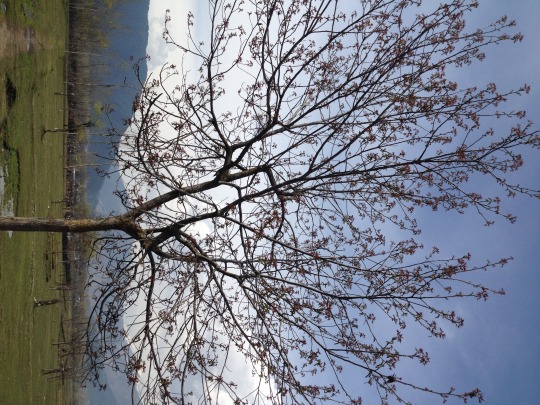
“Agar firdaus bar roo-e-zameen ast,
hamīñ ast-o hamīñ ast-o hamīñ ast.”
Paradise on earth.
- Where there’s democracy under military occupation.
I wonder, who you remain a Paradise for?
0 notes
Text
Oh, them Cows!
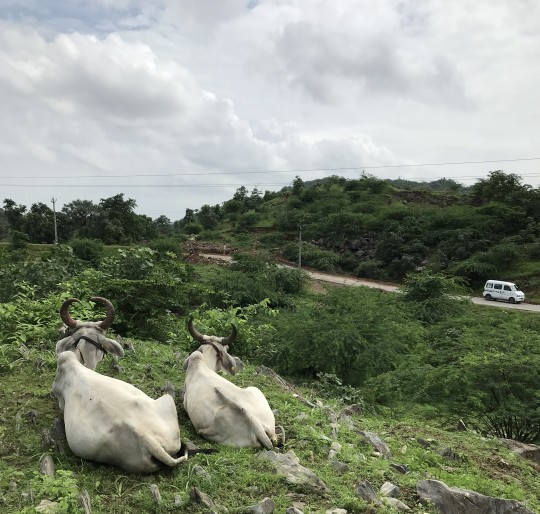
Cows are found in abundance in India. By cows I mean, their children, their aunts, their fathers, their unchaste fathers, their cousins and so sixth. I’m not sure what their population was say, ten years’ earlier, but the place where I work and live at momentarily (PS: It’s Gujarat.) is where re-birth of Cow-dom went down. Cow-dom was birthed, in finest of my knowledge (some Indianised English for you), in a world imagined by handful of people who saw themselves more worldly over “common” folk, which was then labelled and imposed as holy scriptures and spiritual doctrines.
Enough with the ruminations now!
Cows are at every corner, one in almost every lane, at least one in a by-lane, two-three having a chat or smelling one another on a vehicular road, several resting in the middle of a highway/motorway savouring every moment of that historical privilege of how no human can touch them, and many on a familiar or newer food trail. The way I see at it, cows are the most free animals in the country. - A domestic creature which moves and wanders as a wild one.
People of India revere many things. But as most Indians know well, our reverence – be it for anything, comes with disclaimers and T&Cs attached. How can the norm not be applied to cows then, eh? Regardless of worship - according to a faulty yet widely and wildly accepted evolutionary theory - we humans still are top of pyramid goods. No?
Disclaimers are heard aloud through excessive and continuous honking at the animal/s to allow vehicle to pass. Exceptions as to quietly curse the creature when one walks into or slips over fresh pile of shit, or shouting hudd-hudd (the Indian equivalent of shoo, though brutally insulting) by pedestrians who are in a hurry to reach home, but unable to due to cow chaos in the evening are seen normal and necessary. The very same endearing veneration is explicitly visible when one provides sustenance of leftover food and over-ripped veggies (nothing must go waste is our philosophy) to the creature, and likewise witnessed through a light beating (literally light. A hard beating can land you in trouble, and it won’t just be because its animal cruelty) when it arrives at doorstep for some fresh and quality produce. How the force of worship finds itself grossed out when two or more cows are spotted smelling one another bhare bazaar mein (English: in open). But worry not, there’s T&Cs for such occasions well.
To end, Indian citizenry’s relationship with Cows is situational. Let us then keep them passed on beliefs and notions adaptable and amendable as well.
0 notes
Text
Children and Train Journeys

Children on train journeys -
to run around in another constrained space
and yet feel all the freedom in the world.
1 note
·
View note
Text
Veil
Those little girls
look at Them covered in hijab.
Let’s be righteous about it.
Let us feel better for the freedom We and ‘Our Girls’ have.
Ever once a thought,
maybe,
they want to look as their mothers?
0 notes
Text
The Laughter Mystery
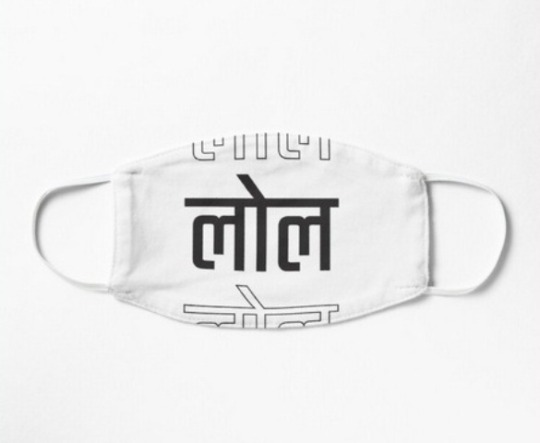
Of all the things I found myself befuddled with previous year (believe me, there were numerous), the one thing, rather a pertinent question of time, an enigma which lugged around was the concept of LOL.
Although a millennial, I am not incredibly inclined to use or think in the abbreviation LOL; which already makes me ancient to a many. What I was fascinated by over several years of observation, was the body language which followed the expression. I mean there is no Laughing out Loud, is it? There is either a reactive ball of breath coughed up with a ‘Ha!’ or there are somewhat suppressed giggles, as if in the most loving-sneering manner someone’s misery is being talked about. No Laugh and audibly nothing Loud.
Why don’t we laugh, rather laugh with our body anymore? I completely and utterly understand the occasions to have a gut-pain inducing or a tear rolling-down-cheek laugh have contracted considerably in past couple of years’, but why is that we starve our body of unrestrained laughter even when the situation presents itself loud and clear?
As I said, it remains a mystery. An unexciting and a petty one, but still. Perhaps, someday the brilliant minds who introduced us to ghosting, zombieing, orbiting and other such anthropologically inspired ‘ings’ shall find a label for this human condition as well.
Till then, I wish we laugh more with our bodies and lessen our indulgence with the coughed up goo. A happier new year, you.
(Image from: Google)
------
Random Ramblings is back! Random Ramblings is an infrequent segment dedicated to the everyday things I see and the occasional ideas and rants that arise from them. Happy reading.
#newyearbeginnings#pettyrant#modrenlife#abbrevationgeneration#lolz#arewelaughterstarved#millenialmusings
0 notes
Photo
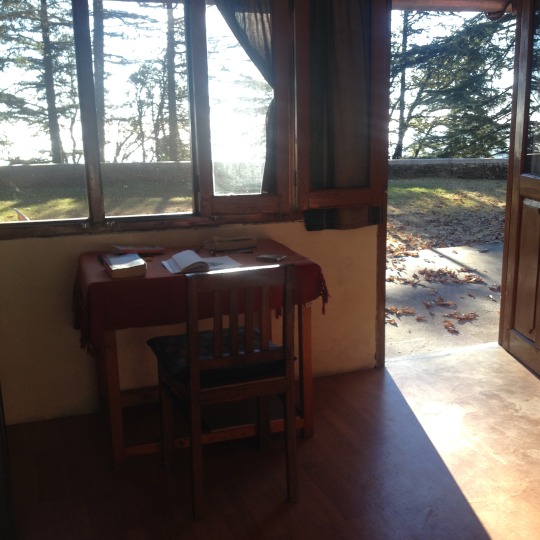
A November memory.
#autumn#indianhimalayas#india#livingalone#seasonofhope#tobealive#landour#mussourie#uttarakhand#leavetolive
6 notes
·
View notes
Text
Stories kitchens tell

These kitchens from the high altitude villages of Indian Himalayas, aside from simplicity have an unrestrained openness to them, don’t you think? Much as the people whose homes these are. Every item owned is displayed with pride. Nothing to hide, they stand vulnerable and resilient unlike our (city-dwellers) wood-panelled detailed kitchens – which I feel are a subtle analogy to the cold and distant behaviour and actions we carry and box ourself in.
15 notes
·
View notes
Text
Epistolary
Like a fabled partner you long to finish my Search.
And yet, after all these years of us being together, you relentlessly taking notes of my interests, my behaviour, my private life, you cannot.
A part of me feels relieved knowing that a part of you still hasn’t crossed over to an ‘Artificial’ life.
0 notes
Text
Journeys - A short story.

It was school holidays. Myra alongwith her Mum and Papa was visiting her Grandparents home in Siliguri. Every year with the onset of winter holidays, even before she was born, Siliguri was her parent’s annual pilgrimage of sorts. Winters in Siliguri because of its proximity to the gentle Indian Himalayas were pleasantly cold and warm at the same time; a much needed gateway from the humidity of Bombay.
Myra’s grandparent’s home was big. It had a small flower garden, a well, a swing and plenty of trees and space to play. For a fortnight everyday of each year was fun and games with Debu and Kabir – her friends and neighbours, nap time stories with Grandpa and lullabies at night with Grandma.
Everyday Myra woke up early. Grandpa, every morning made garlands with flowers and leaves from the garden. She helped Grandpa pick and pluck flowers and leaves and then watch him weave them together. Previous year, Myra learnt how to make a garland from Grandpa. Hers would be of different coloured sweetest smelling flowers. As Grandpa, she would offer hers to God as well. Although not completely aware of the concept and idea of God, she did it because Grandpa followed the ritual, and, she loved the smell of flowers in the morning.
One day after the prayers, Grandpa put his coat on. Myra wanted to know where Grandpa was off to and if she can accompany him. Upon asking, Grandpa smiled and instructed her to put on her warm clothes. He picked a few papers, a cloth bag and within minutes they were on their way.
First was the visit to the veggie market. As they neared the vegetable and fruit gully, Myra was overwhelmed by different aromas all at once - some pungent, many a leafy, few sweet, several earthy. Just as the flowers she collected every morning, the veggie market was colourful and fragrant. It was also very noisy and crowded. With Grandpa holding the palm of her hand firmly, she knew she never be lost. It was the fish market next. It was wet and smelled wet; not good kind of smell at all. She loved eating fish, but this visit to the fish market she did not fancy. As the veggie market, this one was very noisy and crowded as well. And muddy.
On the way back, Grandpa decided to take a different route. Myra was happiest, because at that instant she knew of two ways to reach her grandparent’s home; an important piece of information she thought she can flaunt to and guide her parents with when in town for the next winter holidays.
As Myra was engrossed with this exciting opportunity, Grandpa stopped walking. He removed the papers he had collected from the desk at home from the vest pocket of his coat and put it in a red box. Myra was confused why Grandpa would put his papers in the strange looking dustbin. Bursting with curiosity she questioned him. He giggled and then explained her that the red box with rectangle hole was a post-box. A box where letters are dropped by people, afterwards collected by the postmen, and then delivered to other people as her aunt. Myra had not once seen her parents drop letters in the red box. This was new and exciting for her.
Over the next several days of the remaining holiday days, Grandpa and Myra made the same journey. The nippy and misty mornings became warm and adventurous with the two together. Grandpa narrating contents of the letters sent to his friends, his sister and to the people from Municipal Corporation. Sometimes they would make an additional stop at the milkshake parlour. Cold weather, freezing cold milkshake and the warmest sweater eventually became a core childhood memory.
As years floated, Myra’s grandparents began to make atleast one journey to Bombay to see her. Mum, Papa also planned annual winter holiday trips for the fabulous five - them and Grandma and Grandpa. As she grew, holidays in Siliguri were fewer. With college and university, holidays became new journeys with friends. Ma (Grandma) and Baba (Grandpa) became a part of a grid – a fibre optic internet video grid. Many people would think of it as a loss, but Myra remained close, much much closer to her grandparents. They would talk of their lives, her parents, have inside jokes and more.
It was one fine morning that Myra, now an independent woman, had to be in Kolkata for work. She quickly decided to seize this opportunity to be home in Siliguri for a few days. As she neared her grandparents’ home, she began to recognise a few building structures, some lanes and turns, and instantaneously recollected that the taxi driver had chosen the second way home – one which she and Grandpa walked back on years earlier. Then passed the post-box – the red coloured dustbin which Myra thought it was once, still there, and in that moment her senses were soaked with the memories of those winter morning misty journeys’ with Grandpa.
Upon reaching, she stood outside for a moment. The home looked and smelled the same as it always were - the aroma of mustard infused fish and garden flowers. Days with Grandpa and Grandma were filled with visits from neighbours and long leisure walks and talks. Grandpa with Grandma took Myra to the same milkshake parlour they used to frequent during holidays, again. As she sipped the milkshake from the straw and felt that familiar strawberry flavoured sweetness on her tongue, her body remembered the tingle, the happiness and the warmth it had felt the very first time she had been there.
During her stay, Myra got to know that Grandpa didn’t write letters anymore, nor received any except for bills. When prodded, he said he was happy to have conversations over phone, through video and occasionally, receive letters through an email. This made Myra wonder, who are the people who send letters now-a-days?
Back home in Mumbai as days passed, Myra was unable to let go of the red post-box and the conversations, banter, love and care notes it once delivered. And ultimately on one Saturday of July, she decided to write to her grandparents. Talk of sweet nothings; complain of the monsoons in Mumbai and of what an ordeal waiting for next holiday with friends is. A few weeks after it was posted, she received a letter from Grandpa. He was overjoyed to receive a letter again, after many a years. Furthermore, he narrated how he missed the form of communication and the excitement which accompanied it – to express wholly, to receive a reply, to post it.
Thus, began Myra and her Grandpa’s journey to exchange emotions, photographs and their lives on paper.
#shortstory#journeys#grandparentshome#fiction#puttingpentopaper#letterwriting#storyofapicture#smellsfromchildhood
0 notes
Text
To get to know a city with trees

A few days earlier, I penned a letter to my niece, and found myself talking and writing about trees. Of the trees, I see as I sit by the window at home. It wasn’t how each had a different shade of green, rather, it was about the rustling sound leaves create which is unique to each tree. For a moment I was surprised to have noticed such a subtlety. It is usually the flowering trees and flower-carpeted lanes which awake a sense of wonder and beauty for me. It was only a few moments and thoughts later that I realised having been mesmerised by trees for quite some time now.
It was Ruskin Bond who with his tales quietly introduced tress to me and to many others. It was the Deodars, the Pines, the Oaks, the Cherry, the Mango, the Peepul and many more. He described them not merely with the bloom of flowers and fruits, but also talked of the birds, animals, insects for whom these trees were and are home. He talked long and in full awe of them as seasons changed. He talked of the trunk, the leaves, the greenness, the canopy; he animated their resilience, their generosity, their ingenuity, thus, turning them into one of the many characters in his fables. Someone as me though needed a further push - a not so subtle one to appreciate them from the pages of a book to the ones which I lived, breathed and was surrounded with.
Tree Appreciation Walks - an assorted group of people who love flora and fauna, though more keen on the former, was, therefore, therefore a discovery. And it was one discovery after another as I was introduced to the city I’d been living in for over thirty years’ through trees, shrubs, plants, moss, mangroves and so sixth. With several trees, I discovered the island city’s past: people who newly moved to the city planted many trees which reminded them of their neighbourhood back home; with some plants the onset of a season; through mangroves a glimpse of the future and the rich coastal life it nurtures; and with a few as baobab, lemon myrtle similarities of climate shared with faraway countries of Madagascar, a handful from South America and the continent country of Australia. I had to sit down (literally) to take-in the fascinating realm moss lives, flourishes and has created for itself. While it was the natives – the indigenous grass which is shunned as weeds, allowed me a peek into our collective thinking of how our imagination of nature and wild lean towards outward beauty.
It wasn’t to be acquainted with the island city that I originally joined these Walks. For I, it was to find a few moments of stillness from a city which operates on an always-on mode, and the other being, to get to know a few species of trees and shrubs, so that when I’m travelling alone, to come across a familiar tree or a plant would feel as stumbling upon a chum from back home - a wide smile of familiarity followed by the feeling of warmth even if I’m unable to recollect its name.
While all of the above very much exist, they now cohabit with the fresh intention of discovering the known corners of the city differently. See them, listen to them through trees - to get to know the island city newly. For the children who I accompany, it is the beginning of their foliage journey. For the curious elderly who I follow, it appears as they are being introduced to a friend again – a friend who looks different, its surroundings transformed. I like to think, a sense of how life – the city, the neighbourhood, has changed for the trees and as well for them which they find relatable. For the to-be botanists’, it is about function and knowledge. And for the naturalists and enthusiasts, these walks rouse the wonder and beauty of the living.
Now as I think back on the moment to have penned that letter, it wasn’t an accidental wandering off to the talk about trees, rather it has been a subtle love affair that has announced itself.
————
Tree Appreciation Walks is the passion project of Dr Usha Deasi and Renee Vyas. These two tree chroniclers have yet hosted 109 walks in various parts of the city. It is their slice-of-life narration which invites more and diverse people for each Walk.
#treewalks#citylife#wildinthecity#secretlifeoftrees#foliagejoureny#treeappreciationwalks#RuskinBondstreestories#newlove#readacitywithtrees
2 notes
·
View notes
Text
Harmony of the Mundane

When one travels and is back from their travels, every experience is grand, inspired, mesmerising and adjectives alike. Never a dull moment it seems.
When there had been multiple ones. It is the mundane moments which one tends to forget for the beautiful ones. Nothing wrong with it, you see. Beauty is meant to overwhelm us and enable us look over the mundane. I have done it. All of us do it. It is not a calculated reaction. With the past few journeys however, I have found a new appreciation for the mundane. It can be because of the journal I keep and update as journeying, which has led to a happy realisation that these mundane moments as it happens were moments of small silences – places to rest amid the inspired and hyper-inspired journeys’.
Everyday moments as the wait for the bus, train or other mode of transport to reach the next destination, the wait which is journey itself; how waiting is part of life you cannot escape. Or, to read a vernacular language news daily in the sun, and if there is luxury, watch telly when I’m back Home (which is the homestay or a hotel) after the day’s walk - a ritual followed when not travelling. - A semblance of steadiness it provides to the days’ which look and are non-identical each day. Or, a time when you’d to stay put in the room because of the hailstorm, that book you brought along to read, but in no mood to read it; basically your movement is confined. Or, being surrounded with people who are occupied conversing in their tongue - one you don’t understand, the feeling of being left out, the occasional exchange of glances and a smile to let them know you aren’t feeling out of place, yet, subconsciously making a memory of the gestures, the overheard words and their phonetics, the architecture of home; or, of the mapgpies as they fly hurriedly to find a shelter during the hailstorm, the bitter cold which runs down your spine, the tree trunks wet, the earth wet, both fragrant, distinctively.
Ordinary moments are treasured and many are immortalised within the compositions and canvases of many a great artists. They sacramentalised prosaic, composed serenades for rutting. Insignificant has been their muse. Their artistic works remind us and shall most likely to generations after us that there is beauty to ordinariness and it mustn’t be disregarded neither taken for granted. And yet, many from the travel community neglect the harmony everydayness bring to their journeys’. They are single-mindedly focused on glossy moments – of the dogs who carry on their shoulders (figuratively) the dramatic backdrop of the terrain, to the furry doggos sun-napping often in the middle of the street. It is a cosy sight if you take notice.
Our lives are filled with mundane moments and travel’s no exception. These small moments of silence play a key if subtle role. They invite you to pause, linger and, engender a feeling of connectedness with everything around.
#mundanemoments#theharmonyoftoneswithchords#insignificantisamuse#lookingback#momentsofrespite#thechaosofhyperinspiration
1 note
·
View note
Photo
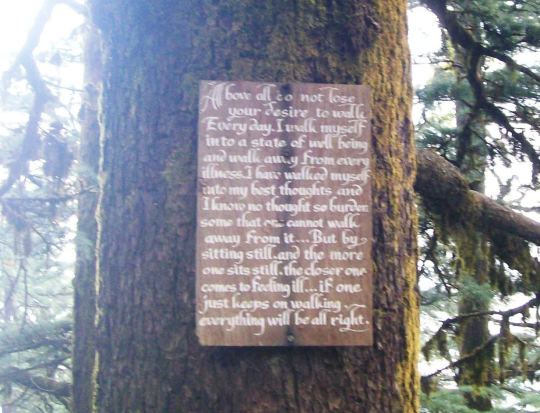
The first time I saw the plank, it was charming. The next time, which was after three love-filled and heart-broken years’, it was an overwhelming moment. Being acutely aware of the time we live in and how swiftly things around us change - jobs, relationships, lovers, childhood, technology and more, the sight of that wooden plank still being there, the words on it still the same, I realised how therapeutic constancy can be.
#india#constancyishealing#memoriesyouareback#whyiwalk#somethingsdontchange#lookingback#surprisestravelbring
1 note
·
View note
Text
Story of a Picture

It is famously said, “A photograph’s worth a thousand words”. Today though, I shall narrate the story of the picture you see.
It is evident that the photograph was shot to have a memory of the moment. What it shan’t say to you is how one rode a few kilometers to find a post-box, because to find and spot a post-box in the age we live is a journey in itself; a forgotten joy which warmly embraces at the sight of one.
The photograph as you see has an assortment of postcards, each of it addressed to someone special. Those postcards were knighted with the name of the person as they were chosen. Also as they were being chosen, subconscious plans of how the journey with the person the postcard was knighted to through the photographic landscape would be was dreamed up.
The photograph shan’t convey how with some people it became a struggle to pen thoughts, because with each of the receivers the connection photographer shares differs. With the chosen person, the photographer is keen to explore the postcard-featured part of the city and simultaneously a part of herself – Her, living in a foreign land.
The photograph shan’t reveal how the photographer has made a memory with the city and some of its corners, several Squares, many a Cafes, roads and lanes, but with this wonderful person it shall be a memory island of ‘Togetherness and Friendship and Love in a Foreign Land’; it will be a lush sunshine feeling even if this spirited person visits during bitter winter.
The photographer is an old soul, as you may have gathered by now. This photograph is much like a selfie, with the photographer proudfully declaring, “This is me, this is how I want to be memorised and thought of”.
That’s it! That is the story behind the picture.
As these are about to be dropped in the post-box, I can imagine the photographer unable to conceal her smile, thinking how happy and delighted and surprised the receiving person shall be and, hoping that her gently woven emotions and journey proposals shall leave them beaming and mesmerised.
-------
An ode to thoughtfulness and quirks of my friend Nikita Shah.
(Photoshot by: Niktia Shah, Kissey jo tasveer na sunnaye.)
1 note
·
View note
Text
A Souvenir

This is how Nida saw me. With a hijab and pheran (a traditional dress-like jumper Kashmiris’ wear), as opposed to the tee-pyjama I wore when we met.
In all likelihood, it is how she will think and memorise me as well. For her, the instinct behind drawing me in this manner was simple and obvious. She wanted her new slightly older friend to look like her. To be comfortable around me, she saw me as she sees her mother, her lovely aunts and her giggling and menacing cousins.
Nida drew me in the manner to feel at home with and around me. Through this caricature she made me a part of her world.
0 notes
Text
Of Trails and Tales

I cannot remember the very first trail I followed. But, I do recollect the first trail journey of the very first time I travelled alone. For those of us who love to travel with themselves, the reminiscences from solo journeys’ are evermore heightened and clear to the erstwhile memories which become fairly muted.
Trails. I find them fascinating and I’m certain so do many before me have and after me shall. They have the ability to make you feel on an adventure – an a off-road-like adventure you visualise as the walk begins, where you conjure up scenarios, collect smells, sights, feel a sense of place and make memories of your own - even when a muddied and broken path is laid out in front of you. There is a visceral joy and intrigue to follow a trail.
There are a few books on trails one can find - Robert Macfarlane’s Lost Ways being one of them. It explores forgotten trails and in a way a lost way of seeing and experiencing beauty and, life. It was when I journeyed through various parts of Kargil and Ladakh having the sculptural mountains by my side each day, I began to imagine how immensely satisfying and breath-taking the trails people created and followed for Silk Route must be. The beauty they would see, the silence and stillness they experience as they made their way through the intimidating yet gentle peaks. Surreal, no?
And, then there are other trails I find deeply healing and moving: the ones which the novellas gives us. It can be traces of Marquez’s Macondo, Chile through Neruda’s words, Ruskin’s laid-back stories and more.
The time I savoured Museum of Innocence* (in written word) I was (and still am) enormously captivated by the vivacity of the museums - celebrated and unknown, Kemal, the protagonist, visits (5723, worldwide) while subconsciously gathering inspiration for his own: his life, family, city of Istanbul where he was born and raised and, largely as an ode and memory to the woman he loved and learned for years’, Füsun. It is a trail I want to follow one day. Go to as many of those museums I can. See, feel and hear the immensely personal stories they tell and delights of everydayness they offer; the latter which many of us have forgotten with the recent narrative of Seize the day or Make each day count, as though ordinariness is a disease.
The life and journey of Bakharwals’ is another trail I want to fill my lungs with. The fictional voyage of Lalla Rookh, civilisations alongside the Nile and closer home, wild & the life which accompanies Brahmaputra, and a much daydreamed of motorcycle expedition of languages, cuisine and sub-cuisine, art and ancient kingdoms through the Hindi-heartland.
It doesn’t matter if the trails I venture onto have been explored by many a people, have been photographed or, written about in detail; I, nonetheless, want to follow them and make them my own: with personal memories, the patch of flat land from where I lost my way, the stones which I recognise, the tress who were my markers and much more.
-------
*Museum of Innocence is a real museum in Istanbul. In a manner of speaking, it is an ode to book by the it’s author Orhan Pamuk, the characters which make the novel and, for many “it is a stunning blur of fiction and reality”.
-------
P.S - I feel that this blog entry, in bits and parts, reads quite similar and sounds familiar to the one written previously – Foreknowledge and Travel. Familiarity and similarity is not a detail I am embarrassed of or shy to admit. I believe that if a certain way of thinking visits again, it is time to rejoice; because those thoughts are growing-up with you - year on year, piece by piece.
#thejoytofollow#museumofinnocence#traillist#personalmemories#trailsandtales#booktrails#recurringthoughts
0 notes
Text
Untitled
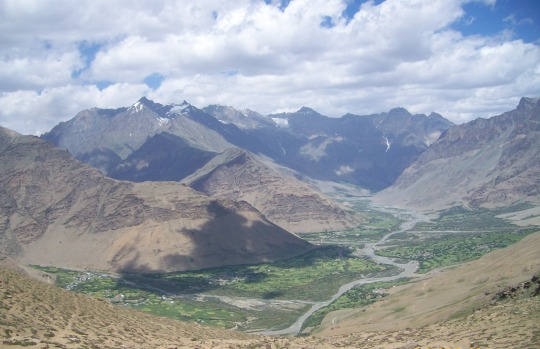
…and you are overwhelmed with a species of happiness unlike other - your eyes smile more than your mouth, you sit-up smell the air, water, tress, you shut down to the conversations around, your mind is still, but your body isn’t: its restless, as if something has got it back to life, has made it breathe again. Inside of you, there is still something that is struggling to get out, perhaps a voice, a scream to express gratitude towards the magnificence you’d witnessed. Melancholically, Sigh is what you utter.
Happiness, can seldom be so deliciously suffocating.
#india#lifeinmountains#ladakh#suruvalley#jammuandkashmir#sigh#thelivinghimalayas#happiness#serenity#speechless#gratitude#insignificance
3 notes
·
View notes
Text
The Local holidays
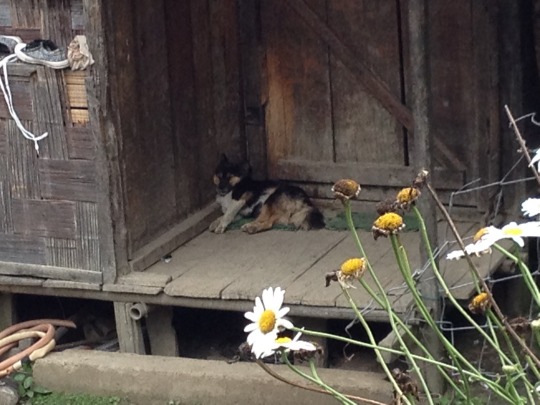
Not so long time earlier, through a magazine article I learnt of Montevideo in Uruguay, and how this architectural and cultural gem of a place, a place yet to be discovered by the traveller and the tourist world is a popular holiday destination of the locals from Argentina.
Suspicious and largely amused I was: Argentinean people prefer a holiday in Montevideo to the vast, unexplored beauty their country offers? Worded by a bloke named Anthony Bourdain, I didn’t think much of it. Nor did it have a lasting impression. It was only when I began with my journeys’, I became aware of the phenomenon that was (and shall remain) Anthony Bourdain.
After his death earlier this year, the chatter around Montevideo reached my ears again. It was a web note, more like a eulogy on the man, the anecdotes and wonderful discoveries which made him the reverential kind for many. Having gallivanted a little bit, what failed to make a lasting impression then, led to a happy realisation now, the few encounters I’ve had till yet had a language; these experiences, these places I were at were the places of local holidays.
Panikhar, Kiphire, Bomdila, Doodhpathri are the names many may have heard for the very first time. So did I. It was only later I became aware that these were the holiday destinations of local people from the state or region. Several are summer beauties, some winter wonderlands, few picnic spots. They are places where in place of tourists’ and travellers’ (these lines surely have begun to blur with every passing day) you find local people soaking in the sun, or having snow fights, or with pulled woollens gazing at the splendor around. Isn’t it fascinating that folks who live in some of the most awwing places go off to find serenity someplace else! The landscapes which can temporarily immobilise one’s vocabulary prowess, which few daydream of - one day I very much like to have a home here and live out rest of my life, a simple rudimentary life (Okay! Alright! It is me who has these dreamy dreams), the locals need a change of scene. Comedic, isn’t it?
Well, back to local holiday places, these are quite simply marvellous getaways for you to introduce to a part of local community. Begin with small talk which hopefully can lead to a conversation, make an effort to understand a bit of culture and nuances attached to it from the people themselves and so forth. This is as real as ‘to travel like a local’ can get – a genuine experience, hearty talks (only if you make them feel at ease) and if you have been generous with listening and your attention to detail, well then, graced with the most beautiful and bountiful food fare.
The information for such places is unlikely to be found on the internet. You have to Make Contact - initiate communication with The Other from your species. It is the very first step for the ones to follow. I can assure you though, the whole experience and the hospitality shall mesmerise you, perhaps in a smallest way change the manner in which you travel, the manner in which you see and approach people. It is an earthy, unfiltered and a pleasantly unplanned affair. Have a go when you can.
#incredibleindia#travel#thelocalholidays#travellinglocally#lesserknownholidays#localfood#localexperiences#offbeatplaces#anthonybourdain
1 note
·
View note